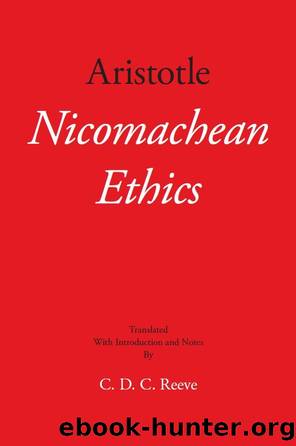Nicomachean Ethics (The New Hackett Aristotle) by Aristotle

Author:Aristotle [Aristotle]
Language: eng
Format: epub
ISBN: 9781624661679
Publisher: Hackett Publishing Company, Inc.
Published: 2014-02-26T05:00:00+00:00
Book II
Note 136
Character: EE II 2 1220b5â7 defines character as âa quality of soul that, though nonrational itself, is capable of obedience to reason by being in accord with a prescriptive reason.â
Note 137
Teaching: Teaching is essentially a linguistic activity: âCertain animals share at once in some learning and teaching, some from each other, some from human beings, these are the ones that have hearingânot just those that hear sounds but those that further perceive the differences between signsâ (HA IX 1 608a17â21; also Pol. I 2 1253a1â18, Po. 19 1456b5â7). In the full sense, it involves formal instruction in a craft or science: âTeaching is what those people do who state the causes of each thingâ (Met. I 2 982a29â30); âAn indication of the one who knows, as opposed to the one who does not know, is his capacity to teach. That is why we think craft knowledge to be more like scientific knowledge than experience is, since craftsmen can teach, while experienced people cannotâ (I 1 981b7â10); âTeaching is argument (logos) in accord with scientific knowledgeâ (Rh. I 1 1355a26). Experience and time: Compare VI 8 1142a11â16.
Note 138
Stone . . . fire: Stone or earth and fire are two of the four sublunary elements Aristotle recognizes; the other two are water and air. Each of these has a rectilinear movement that is natural to it. Thus earth naturally moves down toward the center of the universe, and fire naturally moves upward to the universeâs boundary (Cael. IV 4). Unless compelled or restrained, then, a stone will move downward, fire upward.
Note 139
Brought to completion: A virtue is a sort of completion (Ph. VII 3 246b2), so that by acquiring the virtues we complete our functions and ourselves (NE I 7 1098a12â15).
Note 140
Various (alln): An illogical but common use of allos (for example, Plato, Grg. 473d1, Phd. 62a2â3) not to mean âother,â since this would carry the false suggestion that virtues are themselves crafts, but to mean âvarious.â Also II 4 1105b1.
Note 141
We become just people by doing just actions: âSince all capacities are either innate (like the perceptual capacities) or come about by habit (like that of flute playing) or through learning (like that of the crafts), in the case of some capacitiesânamely, those that come about by habit and by reasonâprevious practice is necessary for their possession but this is not necessary for the ones that are not of this sort and that involve being affectedâ (Met. IX 5 1047b31â35).
Note 142
Constitution (politeia): A politeia is âa sort of way of life (bios) of a cityâ (Pol. IV 11 1295a40âb1); âa certain organization of a cityâs inhabitantsâ (III 1 1274b38) or of its various offices, âabove all, the one with control of everythingâ (III 6 1278b8â10). âIt is by seeking happiness in different ways and by different means that individual groups of people create different ways of life and different constitutionsâ (VII 8 1328a41âb2).
Note 143
Confidence (tharrein): âConfidence is expectation of safety accompanied by the appearance that it is close at hand and that frightening things either do not exist or are far offâ (Rh.
Download
This site does not store any files on its server. We only index and link to content provided by other sites. Please contact the content providers to delete copyright contents if any and email us, we'll remove relevant links or contents immediately.
The remains of the day by Kazuo Ishiguro(8965)
Tools of Titans by Timothy Ferriss(8360)
Giovanni's Room by James Baldwin(7315)
The Black Swan by Nassim Nicholas Taleb(7097)
Inner Engineering: A Yogi's Guide to Joy by Sadhguru(6783)
The Way of Zen by Alan W. Watts(6590)
Asking the Right Questions: A Guide to Critical Thinking by M. Neil Browne & Stuart M. Keeley(5751)
The Power of Now: A Guide to Spiritual Enlightenment by Eckhart Tolle(5742)
The Six Wives Of Henry VIII (WOMEN IN HISTORY) by Fraser Antonia(5493)
Astrophysics for People in a Hurry by Neil DeGrasse Tyson(5172)
Housekeeping by Marilynne Robinson(4433)
12 Rules for Life by Jordan B. Peterson(4298)
Double Down (Diary of a Wimpy Kid Book 11) by Jeff Kinney(4257)
The Ethical Slut by Janet W. Hardy(4236)
Skin in the Game by Nassim Nicholas Taleb(4232)
Ikigai by Héctor García & Francesc Miralles(4229)
The Art of Happiness by The Dalai Lama(4120)
Skin in the Game: Hidden Asymmetries in Daily Life by Nassim Nicholas Taleb(3986)
Walking by Henry David Thoreau(3949)
